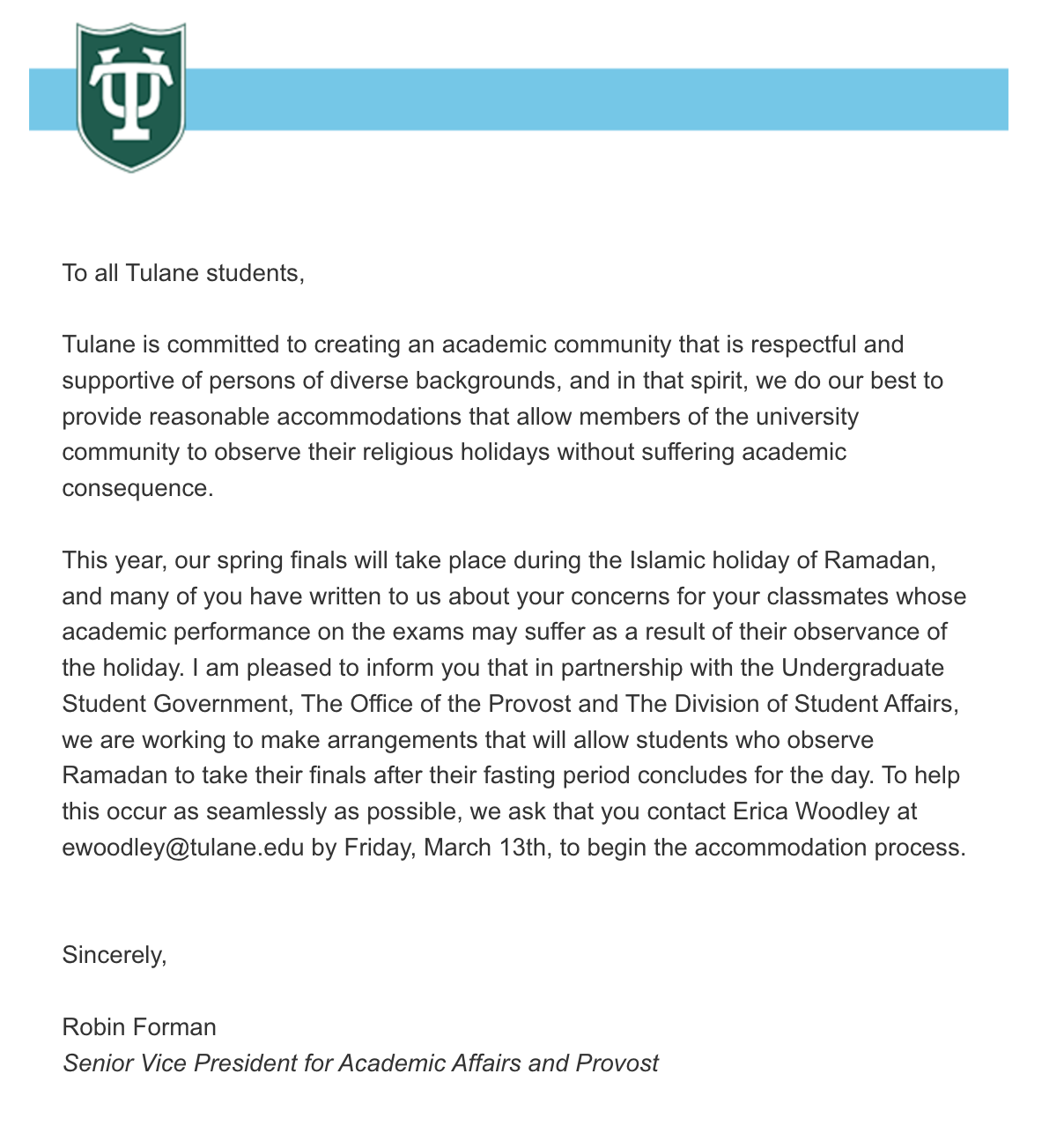Muslim students observing Ramadan can reschedule finals, provost says
Because the Islamic holiday of Ramadan coincides with the spring finals schedule, students observing the holy month can arrange to take their finals at a different time, Robin Forman, senior vice president for Academic Affairs and Provost, announced Thursday in an email to the Tulane student body.
During the month of Ramadan, Muslims fast for 30 days from sunset to sunrise, breaking their fast at dusk. Forman noted that the accommodation will allow students to take their exams in the evening once the fasting period ends for the day.
“Tulane is committed to creating an academic community that is respectful and supportive of persons of diverse backgrounds, and in that spirit, we do our best to provide reasonable accommodations that allow members of the university community to observe their religious holidays without suffering academic consequence,” reads the email from Forman.
He encouraged students to contact Erica Woodley, the assistant vice president and dean of students, student resources and support services, at ewoodley@tulane.edu by Friday, March 13 to begin the accommodation process.
A couple hours after the email, three students had already reached out to Woodley requesting the accommodation.
Though the details will be assessed on a case-by-case basis, Woodley said that the intent was to have fasting students take exams once they’ve eaten their iftar, an evening meal to break the fast. That means students will likely be sitting for an exam from 8:30 p.m. to 1:30 a.m. instead of the three usual final exam slots which are 8 a.m. to 12 p.m., 1 p.m. to 5 p.m., and 5:30 p.m. to 9:30 p.m.
The initiative is a joint effort from the Office of the Provost, the Division of Student Affairs and the Undergraduate Student Government. Woodley said that she had received two messages, one from a student and one from a professor, about Ramadan’s timing and was eager to address it.
Shahmeer Hashmat, USG vice president of Academic Affairs, spearheaded the initiative by reaching out to Woodley in the fall. From there, Hashmat contacted the Goldman Center to ensure students with other accommodations would still be able to take advantage of the arrangement.
“Reach out, and they are going to accommodate, no matter what it is … I really, really hope every student who will be fasting and practicing Ramadan during finals takes advantage of this as they need to,” Hashmat said.
He hopes the initiative will remain in place for years to come. Because the Islamic calendar follows a lunar cycle, the dates of festivals and holidays shift on the secular calendar each year. For the next two years, Ramadan will overlap with the spring final exam period and then will likely occur during the winter final exam period in 2032.

Not all students, however, were thrilled upon receiving the email in their inboxes.
Zahra Saifudeen, Muslim Student Association Executive Board member, expressed frustration that the announcement from Forman did not mention MSA, The Carolyn Barber Pierre Center for Intercultural Life or student organizers.
Saifudeen, with the help of Sienna Abdulahad, former MSA advisor and now-Center for Intercultural Life Director, spent the summer researching other universities and what accommodations they provide for Muslim students.
Her and other Muslim students organized around a number of issues, including the provision of food for Ramadan meals and the inclusion of Ramadan in the academic calendar. Though she was pleased to see the final exam accommodation enacted, Saifudeen wished administrators made more strides to reach out to recognize MSA’s existing efforts regarding Ramadan accommodations.
“This is a very important component of creating a more diverse and inclusive university, but at the same time, if it’s coming from a place that doesn’t recognize and uplift marginalized students and if it doesn’t come from a place of genuineness … and cultural competency — to me, it doesn’t mean the same thing,” Saifudeen said.
Still, many were pleased with Tulane’s announcement that it would follow the lead of other universities that are making similar allowances for Muslim students.
“I was very pleasantly surprised,” said MSA’s newly-elected President Anisah Sahibul. “I hadn’t even really thought myself to reach out and ask for any sort of accommodations.”
Sahibul said that she had taken high school exams in June when the holy month coincided with finals and had been expecting to do the same thing this spring.
“I think it’s a step in the right direction towards Tulane providing more accommodations for minority students on campus, and I’m excited and hopeful to see where they go,” Sahibul said. “I know it won’t be a perfect process — nothing new ever is — but I hope that they work productively with the students who want to be getting these exam accommodations.”
Your donation will support the student journalists of Tulane University. Your contribution will allow us to purchase equipment and cover our annual website hosting costs.



Sarah • Feb 23, 2020 at 6:05 pm
It’s dawn to sunset not the other way around. Fasting sunset to sunrise would mean they could eat during the day.
Muslim Tulane student • Feb 14, 2020 at 4:00 pm
Felt proud to be a Tulanian as I read that email. You’d think only universities with a larger amount of Muslim students and therefore a bigger say on campus would provide accomodations like this, but this proves what can happen when you ask for what you need.
Last Spring I had one or two finals while fasting and it was difficult but doable–a lot about a practicing Muslim’s daily life changes during Ramadan, and finals is taxing as it is—everyone has a different tolerance to physically/mentally draining activities while fasting. With this accomodation it’ll be easier and I’m looking forward to seeing what that will be like.
Thank you to everyone in the Tulane community who put this together.